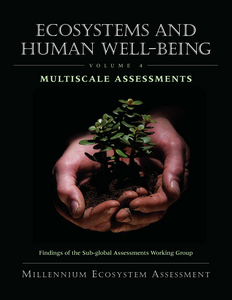Linking ecosystem services and human well-being
McMichael, Anthony, Scholes, Robert, Hefny, Manal, Pereira, Elvira, Palm, Cheryl, and Foale, Simon (2005) Linking ecosystem services and human well-being. In: Capistrano, Doris, Samper K., Cristián, Lee, Marcus J., and Raudsepp-Hearne, Ciara, (eds.) Ecosystems and Human Well-being: multi-scale assessments. MIllenium Ecosystem Assessment Series, 4 . Island Press, Washington DC, USA, pp. 43-60.
![[img]](https://researchonline.jcu.edu.au/19831/4.hassmallThumbnailVersion/19831_McMichael_et_al_2005_book_cover.jpg)
|
Image (JPEG) (Book Cover)
- Cover Image
Download (574kB) |
|
|
PDF (Published Version)
- Published Version
Restricted to Repository staff only |
Abstract
Ecosystem services are indispensable to the well-being of all people in all places. Ecosystem services are the benefits that people obtain from ecosystems, including food, natural fibers, a steady supply of clean water, regulation of pests and diseases, medicinal substances, recreation, and protection from natural hazards such as floods. Human well-being consists of security, the basic materials for a viable livelihood (food, shelter, clothing, energy, etc., or the income necessary to purchase them), freedom and choice, good health, and good social-cultural relations. Links exist in both directions between the flow of ecosystem services and the level of human well-being. These linkages can be illustrated at all scales, from local to global; in all places in the world, from the least to the most developed; and for all peoples, from the poorest to the wealthiest and the rural to the urban and industrialized. There are important issues of equity involved: Who experiences the gains and losses in ecosystem services under conditions of ecosystem change? How are the services and well-being distributed across space and/or time? These issues can only be satisfactorily resolved by adopting a comprehensive approach to development that simultaneously considers ecological, social, and economic outcomes, balancing the interests of all affected groups, as well as the benefits in the present against the options that will be available to future generations.
Despite their obvious importance, ecosystem services are in decline in many places around the world (though some services are increasing in some areas, for example food production in managed ecosystems). In some cases, the loss may be too gradual to be noticed, or may be compensated by increases in other services or in some aspects of human well-being. In other cases, the loss of services is borne by people other than those causing the decline. A special case of the latter occurs when future generations bear the loss, while current generations reap the benefits.
Where the link between ecosystem services and human well-being is clear and immediate, affected people are more likely to develop regulatory institutions to ensure the continued supply of services. In some situations, though, the flow of services may be appropriated by more powerful groups. Also, if the link is obscured, ecosystem services may be undervalued and a severe loss of service can then result. Common reasons for the link not being apparent to all parties include: slow feedbacks (effects are felt long after the causes have taken place); displacement in space (effects are felt far from the cause); or displacement in social class (effects are principally felt by people without power).
The relationship between ecosystem services and human well-being can take on several different forms. Often, rising incomes are initially accompanied by declines in some ecosystem services. Once a sufficient level of wealth is achieved, societal priorities may emphasize the quality of the environment and the services it delivers. In other cases, there is no evidence for such a turn-around, and some services may decline continuously with increasing wealth. In yet other cases, a particular service may improve continuously in tandem with increasing wealth. Note that we do not equate human well-being with wealth; wealth is simply one important and frequently measured component of well-being.
In places where there are no other social safety nets, diminished human well-being tends to increase the immediate dependence on ecosystem services. The resultant additional pressure can damage the capacity of those local ecosystems to deliver services, and this capacity can decline to such a degree that the probability of disaster or conflict increases. The non-linear nature of both human and ecological systems and of the relationship between them means that there are some ecosystem damage thresholds that, if crossed, may prove to be irreversible. In this important respect, the future of the society-ecosystem relationship is rarely a simple linear extrapolation of recent trends or current conditions.
| Item ID: | 19831 |
|---|---|
| Item Type: | Book Chapter (Research - B1) |
| ISBN: | 978-1-55963-185-3 |
| Related URLs: | |
| Additional Information: | Findings of the Sub-global Assessments Working Group |
| Date Deposited: | 15 Feb 2012 05:52 |
| FoR Codes: | 05 ENVIRONMENTAL SCIENCES > 0502 Environmental Science and Management > 050209 Natural Resource Management @ 50% 14 ECONOMICS > 1402 Applied Economics > 140205 Environment and Resource Economics @ 50% |
| SEO Codes: | 96 ENVIRONMENT > 9606 Environmental and Natural Resource Evaluation > 960601 Economic Incentives for Environmental Protection @ 50% 96 ENVIRONMENT > 9605 Ecosystem Assessment and Management > 960599 Ecosystem Assessment and Management not elsewhere classified @ 50% |
| Downloads: |
Total: 3331 Last 12 Months: 29 |
| More Statistics |



